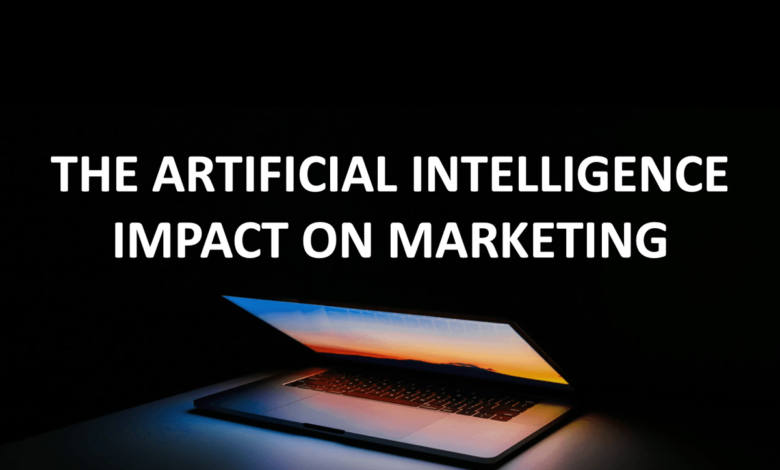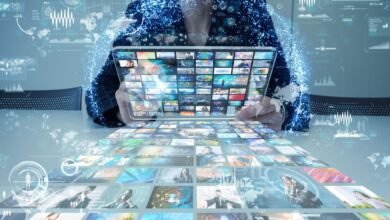The Impact of Artificial Intelligence on Digital Marketing in 2023

Artificial intelligence (AI) has rapidly transformed the world of digital marketing, leading to unprecedented growth and innovation. As we move into 2023, we can expect AI to continue to be a major force in shaping the future of digital marketing. In this article, we will explore the impact of AI on digital marketing, the benefits it brings, and the potential challenges it may pose.
Digital marketing has undergone tremendous changes in the past decade, with new technologies and platforms emerging every year. Artificial intelligence has played a pivotal role in these changes, transforming the way businesses reach and engage with their customers. AI-powered solutions have made it possible to automate repetitive tasks, analyze vast amounts of data, and deliver personalized experiences to customers. In this article, we will discuss how AI is impacting digital marketing and what the future holds for this innovative technology.
Read more: The Importance of Mobile Optimization in Digital Marketing in 2023
What is Artificial Intelligence?
Artificial intelligence is the ability of machines to learn and perform tasks that typically require human intelligence. AI systems can analyze vast amounts of data, recognize patterns, and make predictions based on that data. These systems use algorithms and statistical models to learn from data and improve their performance over time. There are different types of AI, including machine learning, deep learning, and natural language processing (NLP).
The Role of AI in Digital Marketing
AI has transformed digital marketing in several ways. It has made it possible to automate repetitive tasks, analyze vast amounts of data, and deliver personalized experiences to customers. AI-powered solutions have also made it easier for marketers to identify and target specific audiences, optimize their campaigns, and measure their success.
Benefits of AI in Digital Marketing

The benefits of AI in digital marketing are numerous. Here are a few:
1. Automation
AI can automate repetitive tasks such as ad targeting, keyword research, and A/B testing. This frees up marketers’ time to focus on more strategic tasks, such as developing new campaigns and analyzing data.
2. Personalization
AI can deliver personalized experiences to customers by analyzing their preferences and behavior. This can improve customer engagement and loyalty, leading to increased revenue and brand awareness.
3. Optimization
AI can optimize campaigns in real-time by adjusting bids, targeting, and ad creative based on performance data. This can improve ROI and reduce ad spend waste.
4. Predictive Analytics
AI can analyze vast amounts of data and make predictions about future trends and customer behavior. This can help marketers make more informed decisions and adjust their strategies accordingly.
Challenges of AI in Digital Marketing
While the benefits of AI in digital marketing are significant, there are also challenges that must be addressed. These challenges include:
1. Data Quality
AI requires high-quality data to perform well. If the data is incomplete, inaccurate, or biased, the AI system will produce unreliable results.
2. Algorithm Bias
AI algorithms may contain biases that reflect the biases of their creators. This can lead to unfair or discriminatory outcomes.
3. Ethical Considerations
AI can raise ethical concerns, such as the use of personal data, the impact on employment, and the potential for AI to replace human decision-making.
AI and Search Engine Optimization (SEO)
Search engine optimization (SEO) is one area where AI is having a significant impact. AI-powered SEO tools can analyze vast amounts of data to identify keywords, optimize content, and track rankings. AI can also help identify search intent, enabling marketers to deliver more relevant content to users. With the rise of voice search and natural language processing, AI is becoming increasingly important in SEO.
AI and Content Marketing
AI is also transforming content marketing. AI-powered content creation tools can generate articles, videos, and social media posts based on data and user preferences. These tools can also optimize content for search engines and personalize it for specific audiences. AI can also analyze content performance, making it easier for marketers to identify successful strategies and adjust their content accordingly.
AI and Social Media Marketing
Social media marketing is another area where AI is making a significant impact. AI-powered social media tools can analyze vast amounts of data to identify trends, track engagement, and optimize ad targeting. AI can also deliver personalized content to users based on their preferences and behavior, leading to increased engagement and conversions.
AI and Email Marketing
AI is also transforming email marketing. AI-powered email marketing tools can analyze user data to personalize email content and optimize send times. AI can also predict user behavior, making it easier for marketers to identify which users are most likely to convert and tailor their messaging accordingly.
AI and Personalization
Personalization is a key benefit of AI in digital marketing. By analyzing user data, AI can deliver personalized experiences to customers, such as tailored product recommendations and personalized messaging. Personalization can improve customer engagement and loyalty, leading to increased revenue and brand awareness.
AI and Customer Experience
AI is also transforming the customer experience. AI-powered chatbots and virtual assistants can provide 24/7 support to customers, answering their questions and resolving issues in real-time. AI can also analyze customer feedback to identify areas for improvement and personalize the customer experience based on their preferences.
AI and Data Analytics
Data analytics is another area where AI is having a significant impact. AI-powered data analytics tools can analyze vast amounts of data to identify patterns, make predictions, and provide insights into customer behavior. This can help marketers make more informed decisions and adjust their strategies accordingly.
Ethical Considerations of AI in Digital Marketing
As AI becomes more prevalent in digital marketing, there are ethical considerations that must be addressed. These include the use of personal data, algorithm bias, and the potential for AI to replace human decision-making. Marketers must ensure that their use of AI is transparent and ethical, respecting users’ privacy and avoiding discriminatory outcomes.
Future of AI in Digital Marketing
As we move into 2023 and beyond, we can expect AI to continue to play a significant role in digital marketing. AI will become increasingly integrated into digital marketing strategies, enabling marketers to automate tasks, deliver personalized experiences, and analyze vast amounts of data. While there are challenges to be addressed, the benefits of AI in digital marketing are significant and will continue to drive innovation and growth.
Read more: The Impact of Artificial Intelligence on Jobs and the Future of Work in 2023
Conclusion
Artificial intelligence is transforming the world of digital marketing, enabling marketers to automate tasks, deliver personalized experiences, and analyze vast amounts of data. While there are challenges to be addressed, the benefits of AI in digital marketing are significant and will continue to drive innovation and growth. As we move into 2023 and beyond, we can expect AI to play an increasingly important role in shaping the future of digital marketing.
FAQs
How is AI transforming search engine optimization (SEO)?
AI-powered SEO tools can analyze vast amounts of data to identify keywords, optimize content, and track rankings. AI can also help identify search intent, enabling marketers to deliver more relevant content to users. With the rise of voice search and natural language processing, AI is becoming increasingly important in SEO.
What are the benefits of AI in content marketing?
AI-powered content creation tools can generate articles, videos, and social media posts based on data and user preferences. These tools can also optimize content for search engines and personalize it for specific audiences. AI can also analyze content performance, making it easier for marketers to identify successful strategies and adjust their content accordingly.
How is AI transforming social media marketing?
AI-powered social media tools can analyze vast amounts of data to identify trends, track engagement, and optimize ad targeting. AI can also deliver personalized content to users based on their preferences and behavior, leading to increased engagement and conversions.
What are the ethical considerations of AI in digital marketing?
As AI becomes more prevalent in digital marketing, there are ethical considerations that must be addressed. These include the use of personal data, algorithm bias, and the potential for AI to replace human decision-making. Marketers must ensure that their use of AI is transparent and ethical, respecting users’ privacy and avoiding discriminatory outcomes.
What is the future of AI in digital marketing?
As we move into 2023 and beyond, we can expect AI to continue to play a significant role in digital marketing. AI will become increasingly integrated into digital marketing strategies, enabling marketers to automate tasks, deliver personalized experiences, and analyze vast amounts of data. While there are challenges to be addressed, the benefits of AI in digital marketing are significant and will continue to drive innovation and growth.











